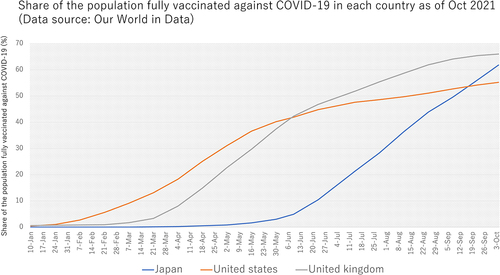KEYWORDS:
Letter
Increasing the vaccination rate is essential for controlling COVID-19. In April 2021, Japan’s vaccination rate was 4% before the Olympics and Paralympics.Citation1 Nevertheless, the Japanese government promoted COVID-19 vaccination. On October 4, 2021, more than 77 million people completed the vaccination series, compatible with 61.8% of the targeted population (). In particular, the COVID-19 vaccination rate for elderly persons reached 89.4%.Citation2
The vaccination order is described on the website of the Prime Minister of Japan and his cabinet. The minister in charge of vaccines was appointed in January 2021. Vaccination for 40,000 healthcare professionals was started on February 17. Vaccination for elderly persons was started on April 12 after vouchers were distributed. Because the vaccine was supplied gradually by the pharmaceutical company, eligibility was prioritized based on age and risk factors.
The vaccine was not mandatory, being administered only with the recipient’s consent. The vaccination was free for all Japanese citizens and eligible foreign residents. The government started mass and workplace vaccination programs. Vaccination started with the mRNA vaccine by Pfizer-BioNTech, and use of the Moderna COVID-19 (mRNA-1273) vaccine started from May 2021 for workplace vaccination. The vaccine rate increased quickly from May; the maximum number of daily inoculations was 1.6 million.Citation2
Several factors were related to the rapid increase in COVID-19 vaccination in Japan. First, the government adopted mass workplace vaccination for the first time. Second, the Japanese attitude toward COVID-19 vaccination improved, which differed from before. A sense of crisis related to COVID-19 might have increased the vaccination rate. Similarly, the pneumococcal vaccination rate was reported to increase during the COVID-19 pandemic.Citation3
Previously, the attitude of Japanese society was less favorable toward vaccination.Citation4 In 2013, the Ministry of Public Health changed its policy to not actively recommending human papillomavirus vaccination because of public opposition. The Japanese mass media was criticized for negative campaigns against the vaccine.Citation5 Detailed, evidence-based COVID-19 vaccination information was published by the government and most of the mass media. The government decided to start vaccination of healthcare staff. Concise vaccine information, including side effects, was shared based on the healthcare staff data. The general population had enough information to judge the effectiveness of the COVID-19 vaccination based on these data.
Japan achieved a rapid increase in its COVID-19 vaccination rate after May 2021. The government strategy for COVID-19 vaccination and evidence-based press reporting resulted in rapid achievement of a high Japanese vaccination rate.
Disclosure statement
No potential conflict of interest was reported by the author(s).
Additional information
Funding
References
- Kosaka M, Hashimoto T, Ozaki A, Tanimoto T, Kami M. Delayed COVID-19 vaccine roll-out in Japan. Lancet. 2021;397(10292):2334–2. doi:10.1016/S0140-6736(21)01220-4.
- Prime Minister of Japan and His Cabinet. Novel Coronavirus vaccines. [ accessed 2021 Oct 6]. https://www.kantei.go.jp/jp/headline/kansensho/vaccine.html.
- Komori A, Mori H, Naito T. The COVID-19 pandemic increased the demand for pneumococcal vaccination in Japan. Hum Vaccin Immunother. 2021;1–2. doi:10.1080/21645515.2021.1958612.
- de Figueiredo A, Simas C, Karafillakis E, Paterson P, Larson HJ. Mapping global trends in vaccine confidence and investigating barriers to vaccine uptake: a large-scale retrospective temporal modelling study. Lancet. 2020;396(10255):898–908. doi:10.1016/S0140-6736(20)31558-0.
- Mizumachi K, Aoki H, Kitano T, Onishi T, Takeyama M, Shima M. How to recover lost vaccine acceptance? A multi-center survey on HPV vaccine acceptance in Japan. J Infect Chemother. 2021;27(3):445–49. doi:10.1016/j.jiac.2020.10.012.

